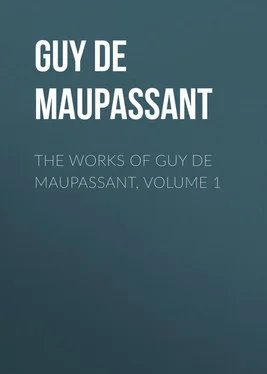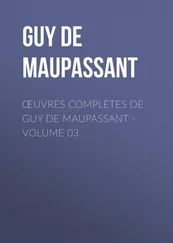Guy Maupassant - The Works of Guy de Maupassant, Volume 1
Здесь есть возможность читать онлайн «Guy Maupassant - The Works of Guy de Maupassant, Volume 1» — ознакомительный отрывок электронной книги совершенно бесплатно, а после прочтения отрывка купить полную версию. В некоторых случаях можно слушать аудио, скачать через торрент в формате fb2 и присутствует краткое содержание. Жанр: literature_19, foreign_antique, foreign_prose, на английском языке. Описание произведения, (предисловие) а так же отзывы посетителей доступны на портале библиотеки ЛибКат.
- Название:The Works of Guy de Maupassant, Volume 1
- Автор:
- Жанр:
- Год:неизвестен
- ISBN:нет данных
- Рейтинг книги:4 / 5. Голосов: 1
-
Избранное:Добавить в избранное
- Отзывы:
-
Ваша оценка:
- 80
- 1
- 2
- 3
- 4
- 5
The Works of Guy de Maupassant, Volume 1: краткое содержание, описание и аннотация
Предлагаем к чтению аннотацию, описание, краткое содержание или предисловие (зависит от того, что написал сам автор книги «The Works of Guy de Maupassant, Volume 1»). Если вы не нашли необходимую информацию о книге — напишите в комментариях, мы постараемся отыскать её.
The Works of Guy de Maupassant, Volume 1 — читать онлайн ознакомительный отрывок
Ниже представлен текст книги, разбитый по страницам. Система сохранения места последней прочитанной страницы, позволяет с удобством читать онлайн бесплатно книгу «The Works of Guy de Maupassant, Volume 1», без необходимости каждый раз заново искать на чём Вы остановились. Поставьте закладку, и сможете в любой момент перейти на страницу, на которой закончили чтение.
Интервал:
Закладка:
Monsieur and Madame Follenvie supped at the farther end of the table. The husband – puffing and blowing like a bursting locomotive – had too much cold on the chest to be able to speak and eat at the same time, but his wife never ceased talking. She described her every impression at the arrival of the Prussians and all they did and all they said, execrating them in the first place because they cost so much, and secondly because she had two sons in the army. She addressed herself chiefly to the Countess, as it flattered her to be able to say she had conversed with a lady of quality.
She presently lowered her voice and proceeded to recount some rather delicate matters, her husband breaking in from time to time with – "You had much better hold your tongue, Madame Follenvie," – to which she paid not the slightest attention, but went on.
"Well, madame, as I was saying – these men, they do nothing but eat potatoes and pork and pork and potatoes from morning till night. And as for their habits – ! And you should see them exercising for hours and days together out there in the fields – It's forward march and backward march, and turn this way and turn that. If they even worked in the fields or mended the roads in their own country! But, no, madame, these soldiers are no good to anybody, and the poor people have to keep them and feed them simply that they may learn how to massacre. I know I am only a poor ignorant old woman, but when I see these men wearing themselves out by tramping up and down from morning till night, I cannot help saying to myself, if there are some people who make a lot of useful discoveries, why should others give themselves so much trouble to do harm? After all, isn't it an abomination to kill anybody, no matter whether they are Prussians, or English, or Poles, or French? If you revenge yourself on some one who has harmed you that is wicked, and you are taken up and punished; but let them shoot down our sons as if they were game, and it is all right, and they give medals to the man who kills the most. No, no, look you, I shall never be able to see any rhyme or reason in that!"
"War is barbarous if one attacks an unoffending neighbor – it is a sacred duty if one defends one's country," remarked Cornudet in a declamatory tone.
The old woman nodded assent. "Yes – defending oneself, of course, that is quite another thing; but wouldn't it be better to kill all these kings who do this for their pleasure?"
Cornudet's eyes flashed. "Bravo, citizeness!" he cried.
Monsieur Carré-Lamadon was lost in thought. Although he was an ardent admirer of famous military men, the sound common sense of this peasant woman's observations made him reflect upon the wealth which would necessarily accrue to the country if all these unemployed and consequently ruinous hands – so much unproductive force – were available for the great industrial works that would take centuries to complete.
Loiseau meanwhile had left his seat and gone over beside the innkeeper, to whom he began talking in a low voice. The fat man laughed, coughed, and spat, his unwieldy stomach shaking with mirth at his neighbor's jokes, and he bought six hogsheads of claret from him for the spring when the Prussians would have cleared out.
Supper was scarcely over when, dropping with fatigue, everybody went off to bed.
Loiseau, however, who had made certain observations, let his wife go to bed and proceeded to glue first his ear and then his eye to the keyhole, endeavoring to penetrate what he called "the mysteries of the corridor."
After about half an hour he heard a rustling, and hurrying to the keyhole, he perceived Boule de Suif looking ampler than ever in a dressing-gown of blue cashmere trimmed with white lace. She had a candle in her hand and was going towards the end of the corridor. Then a door at one side opened cautiously, and when she returned after a few minutes, Cornudet in his shirt sleeves was following her. They were talking in a low voice and presently stood still; Boule de Suif apparently defending the entrance of her room with much energy. Unfortunately Loiseau was unable to hear what they said till, at the last, as they raised their voices somewhat, he caught a word or two. Cornudet was insisting eagerly. "Look here," he said, "you are really very ridiculous – what difference can it make to you?"
And she with an offended air retorted, "No! – let me tell you there are moments when that sort of thing won't do; and besides – here – it would be a crying shame."
He obviously did not understand. "Why?"
At this she grew angry. "Why?" and she raised her voice still more, "you don't see why? and there are Prussians in the house – in the next room for all you know!"
He made no reply. This display of patriotic prudery evidently aroused his failing dignity, for with a brief salute he made for his own door on tiptoe.
Loiseau deeply thrilled and amused, executed a double shuffle in the middle of the room, donned his nightcap, and slipped into the blankets where the bony figure of his spouse already reposed.
The whole house sank to silence. But anon there arose from somewhere – it might have been the cellar, it might have been the attics – impossible to determine the direction – a rumbling – sonorous, even, regular, dull, prolonged roar as of a boiler under high steam pressure: Monsieur Follenvie slept.
It had been decided that they should start at eight o'clock the next morning, so they were all assembled in the kitchen by that hour; but the diligence, roofed with snow, stood solitary in the middle of the courtyard without horses or driver. The latter was sought for in vain either in the stables or the coachhouse. The men of the party then resolved to beat the country round for him, and went out accordingly. They found themselves in the public square with the church at one end, and low-roofed houses down each side in which they caught sight of Prussian soldiers. The first one they came upon was peeling potatoes; farther on another was washing out a barber's shop; while a third, bearded to the eyes, was soothing a crying child and rocking it to and fro on his knee to quiet it. The big peasant woman whose men were all "with the army in the war" were ordering about their docile conquerors and showing them by signs what work they wanted done – chopping wood, grinding coffee, fetching water; one of them was even doing the washing for his hostess, a helpless old crone.
The Count, much astonished, stopped the beadle, who happened to come out of the vestry at that moment, and asked the meaning of it all.
"Oh," replied the old church rat, "these are not at all bad. From what I hear they are not Prussians, either; they come from farther off, but where I can't say; and they have all left a wife and children at home. I am very sure the women down there are crying for their men, too, and it will all make a nice lot of misery for them as well as for us. We are not so badly off here for the moment, because they do not harm and are working just as if they were in their own homes. You see, Monsieur, the poor always help one another; it is the great people who make the wars."
Cornudet, indignant at the friendly understanding established between the victors and the vanquished, retired from the scene, preferring to shut himself up in the inn. Loiseau of course must have his joke. "They are re-populating," he said. Monsieur Carré-Lamadon found a more fitting expression. "They are repairing."
But the driver was nowhere to be found. At last he was unearthed in the village café hobnobbing fraternally with the officer's orderly.
"Did you not have orders to have the diligence ready by eight o'clock?" the Count asked him.
"Oh, yes, but I got another order later on."
"What?"
"Not to put the horses in at all."
"Who gave you that order?"
Читать дальшеИнтервал:
Закладка:
Похожие книги на «The Works of Guy de Maupassant, Volume 1»
Представляем Вашему вниманию похожие книги на «The Works of Guy de Maupassant, Volume 1» списком для выбора. Мы отобрали схожую по названию и смыслу литературу в надежде предоставить читателям больше вариантов отыскать новые, интересные, ещё непрочитанные произведения.
Обсуждение, отзывы о книге «The Works of Guy de Maupassant, Volume 1» и просто собственные мнения читателей. Оставьте ваши комментарии, напишите, что Вы думаете о произведении, его смысле или главных героях. Укажите что конкретно понравилось, а что нет, и почему Вы так считаете.












